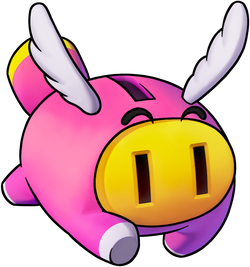Snoutlet
This article is about a subject in an upcoming or recently released game. When the game is released, or more information about this subject is found, this article may need major rewriting.
This notice should be removed after a month has passed since the game was first released.
| Snoutlet | |
|---|---|
 Snoutlet from Mario & Luigi: Brothership. | |
| Species | Winged Concordian creature |
| First appearance | Mario & Luigi: Brothership (2024) |
- “Oh—but let's be clear. I AIN'T a pig.”
- —Snoutlet, Mario & Luigi: Brothership
Snoutlet is a major character from Mario & Luigi: Brothership. It is a flying piggy bank-like creature who acts as Mario and Luigi's advisor throughout their adventure in Concordia where it resides. Despite its appearance, it angrily denies being a pig. Its role seems to be similar to Stuffwell, Starlow, and Prince Dreambert from previous Mario & Luigi titles as the brothers' primary companion. Its name is a portmanteau of "snout", referring to a pig's nose, and "outlet", which refers to an electrical output socket.
Profile
- Japanese website bio: ブタの貯金箱のような見た目をした、ちょっぴり個性的なキャラクター。コネッタと同じく、マリオたちとは船島で初めて出会った。見知らぬ土地の案内役として、コネクタルランドでの冒険をサポートしてくれる。[1](A slightly unique character who looks like a piggy bank. Like Connie, it first met Mario and his friends on Shipshape Island. As a guide in a strange land, it supports Mario and his friends in their adventures in Concordia.)
Gallery
Names in other languages
| Language | Name | Meaning | Notes |
|---|---|---|---|
| Japanese | タップー[1] Tappū |
Elongation of 「タップ」(tappu, "tap"), a reference to table tap | |
| Dutch | Trufvolt[?] | Portmanteau of truffel ("truffle"), likely referring to truffle hogs, and "volt" | |
| French | Couchomb[2] | Portmanteau of cochon ("pig") and "coulomb" | |
| German | Wattz[?] | From "Watt" (a unit of power) and possibly the surname suffix -witz | |
| Italian | Presus[?] | Portmanteau of presa ("outlet") and possibly the pigs' genus Sus; also similar to the name "Perseus" | |
| Portuguese | Pligue[3] | From plugue ("plug") and presumably "pig" | |
| Spanish | Porcopolo[?] | Portmanteau of puerco ("pig") and "Marco Polo", likely also referencing polo ("pole" in electronics) |
References
- ^ a b 冒険の拠点や新しいブラザーアタックなど、『マリオ&ルイージRPG ブラザーシップ!』の新情報を公開。. nintendo.co.jp (Japanese).
- ^ Nintendo France (June 18, 2024). Mario & Luigi : L'épopée fraternelle – Sortie le 7 novembre (Nintendo Switch). YouTube (French).
- ^ https://www.nintendo.com/pt-br/store/products/mario-and-luigi-brothership-switch/


